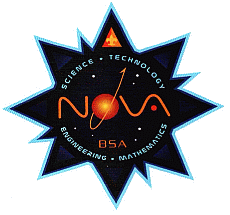The requirements shown below became effective
on June 1, 2015. when the rank requirements for Cub Scouts changed
and may be used only until December 31, 2017.
Cub Scouts who were working on the Nova awards or one of the Supernova awards prior to December 31, 2015, had two options:
Complete the award no later than December 31,
2015, using the original requirements
as published in the original Cub Scout Nova Awards Guidebook (No. 34032
/ SKU 614935)
or
Complete the award using the requirements shown below.
Cub Scouts working on the Nova awards or one of the Supernova awards in 2017 have two options:
Complete the award no later than December 31,
2017, using the requirements shown below
or
Complete the award using the current requirements.
New text is in bold GREEN underlined
Serif text like this sentence.
Deleted text is in struck through RED italic text like
this sentence.
To see these requirements, without the changes highlighted, Click here .
For the original requirements, Click here.
To see the current requirements, Click here.
This module is designed to help you explore how science affects your life each day.
- Choose A or B or C and complete ALL the requirements.
- Watch an episode or episodes (about one hour total) of a show about
anything related to science. Then do the following:
- Make a list of at least two questions or ideas from what you watched.
- Discuss two of the questions or ideas with your counselor.
Some examples include - but are not limited to - shows found on PBS ("NOVA"), Discovery Channel, Science Channel, National Geographic Channel, TED Talks (online videos), and the History Channel. You may choose to watch a live performance or movie at a planetarium or science museum instead of watching a media production. You may watch online productions with your counselor's approval and under your parent's supervision.
- Read (about one hour total) about anything related to science. Then
do the following:
- Make a list of at least two questions or ideas from what you read.
- Discuss two of the questions or ideas with your counselor.
Books on many topics may be found at your local library. Examples of magazines include but are not limited to Odyssey, KIDS DISCOVER, National Geographic Kids, Highlights, and OWL or owlkids.com.
- Do a combination of reading and watching (about one hour total)
about anything related to science. Then do the following:
- Make a list of at least two questions or ideas from what you read and watched.
- Discuss two of the questions or ideas with your counselor.
- Watch an episode or episodes (about one hour total) of a show about
anything related to science. Then do the following:
- Complete ONE belt loop or pin
adventure from the following list. (Choose one
that you have not already earned.)
Astronomy Nutrition Collecting Pet Care Geography Photography Geology Science Map and Compass Weather Wolf Cub Scouts Bear Cub Scouts Webelos Scouts Adventures in Coins A Bear Goes Fishing Camper Collections and Hobbies Bear Picnic Earth Rocks Digging in the Past Critter Care Maestro Germs Alive Grow Something - Act like a scientist! Do
Explore EACH of the following:
- With your counselor, choose a question you would like to investigate.
Here are some examples only (you may get other ideas from your belt loop or pin adventure activities):- Why do rockets have fins? Is there any connection between the feathers on arrows and fins on rockets?
- Why do some cars have spoilers? How do spoilers work?
- If there is a creek or stream in your neighborhood, where does it go? Does your stream flow to the Atlantic or the Pacific ocean?
- Is the creek or stream in your neighborhood or park polluted?
- What other activity can you think of that involves some kind of scientific questions or investigation?
With your parent's or guardian's permission and assistance, you may want to use an online mapping application to follow the streams and rivers to the ocean. Keep track of the names of the streams, lakes, and rivers connecting your stream to the ocean. Is it possible for you to find out the name of your watershed? Paddle-to-the-Sea by Holling C. Holling is a fun book on this topic. You can do a stream sample to find out what kinds of things are living in the water and under the rocks. Some things can survive in polluted water; others can live only in clean water. You can discover if a stream is polluted by finding out what lives there.
- With your counselor, choose a question you would like to investigate.
- With a parent or your counselor, use the
scientific method/process to investigate your question. Keep records
of your question, the information you found, how you investigated, and
what you found out about your question.
You may do 3B with another Cub Scout if you would like, but you need to do and record your own work.
- Discuss your investigation and findings with your counselor.
- During your visit, talk to someone in charge about science.
- Discuss with your counselor the science done, used, or explained at the place you visited.
The requirements for and further information about
this award may be found in the 2012 edition of the
Cub Scout Nova Awards Guidebook (BSA Publication No. 34032/ SKU 614935)








